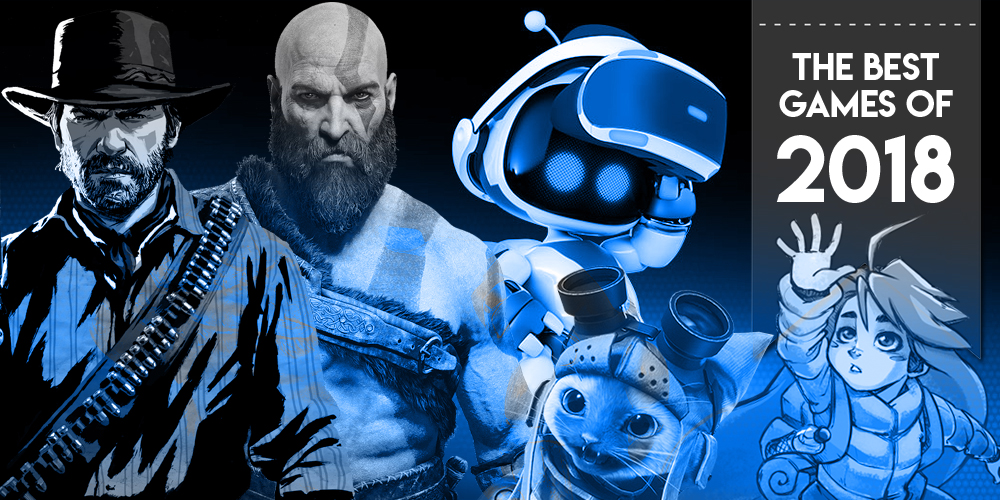
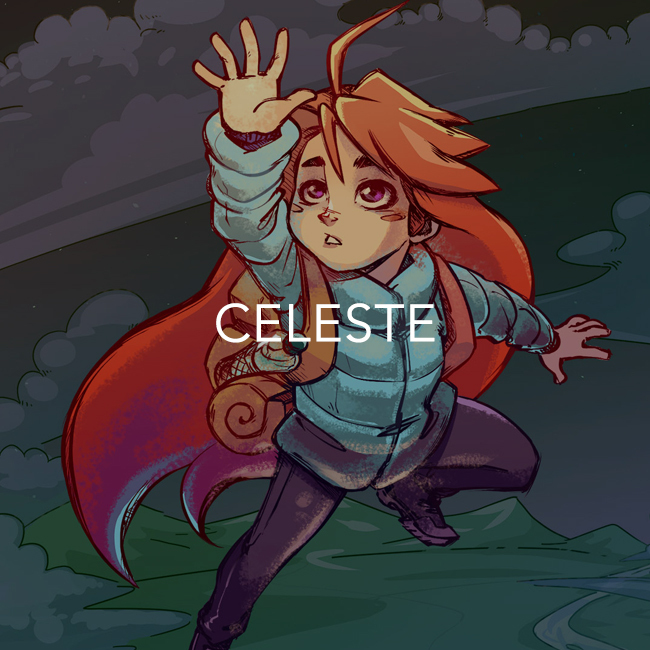
Chosen by: Ben West
Developer: Matt Makes Games
Platforms: PS4, Xbox One, PC, Switch
Celeste caught me by surprise in the early part of the year. I’d been looking for another challenging platformer for a while, and reviews at the time seemed to indicate that Celeste was special, but rarely delved too deeply into why, generally emphasising that it was an experience that needed to be played. I found this to be very true in practice: once I started playing Celeste, it was the sole thought I had for the entire time it took me to beat it, and I was sad to see it finished on the other end.
It’s due to a number of key elements that Celeste gets spot-on right. Quick retries accompanied by brutal difficulty, much in the style of Super Meat Boy, but executed in a way that felt more like careful finesse than twitch reactions. Delightful characters, all lovable, written with more wit and charm than I often come across, and who are still burned in my memory today. A simple story, lovingly told, with moments that touched me personally. Finally, the drive of well-executed collectables, easily tracked: I couldn’t resist taking the time to find each and every one of them.
There’s barely a handful of games like Celeste that come out each year: meaningful, engaging and delightful. On reflection, most of the year was a bit of a blur for me, but the time I spent playing Celeste is a crystal clear memory of a week very well spent. If you’ve ever lost yourself in a story of self-discovery, or spent a late night determined to beat a seemingly impossible platforming challenge before sleep, Celeste is an experience you can’t allow yourself to miss.

Chosen by: Patrick Waring
Developer: Capcom
Platforms: PS4, Xbox One, PC
There are other games on this list that I could have chosen, but I would be remiss, and a hypocrite, if I didn’t put forward Monster Hunter: World as a personal game of the year. In a year where I’ve had increasingly less time for games than I’ve had in the past, I still dropped over 200 hours into it across two platforms. I mean, I love classic Monster Hunter, and my combined hour count on the handheld versions completely eclipses that of World, but this game has got its hooks in me good.
I’ve said it before about the series, but its best strength is its gameplay loop and core design: you hunt so that you can craft better gear so you can hunt better monsters so that you can craft better gear. It’s gameplay rewarded with gameplay all the way through, and Monster Hunter: World has cut out a lot of the guff from the handheld versions to make it more palatable and streamlined for a wider audience. And I mean a lot of the guff. No more having to stop and celebrate that you’ve quaffed a potion while a Tigrex comes barreling toward you, for a start. God, I hope they put Tigrexes in the new update.
Now, I can totally understand if fans of classic Monster Hunter don’t like the new changes because they diverge from the challenge of the old games. And to that I say, “PPPFFFFTTTTTBFBTBTBFBTBTBFBTBFBTB.” These changes don’t make it any less fun, quite the opposite in fact. It’s 200+ hours of fun, at least. I think that with the release of Monster Hunter Generations Ultimate earlier this year, there’s still a place for classic Monster Hunter, with World being a spin-off series in its own right. It’s also clear that Capcom intends to support World for some time, giving PC players an accelerated update schedule after the release delay, and announcing the huge Iceborne expansion to be released late 2019. It’s such a massive game already and looks as though things will carry forward into next year, making it just as big. Good hunting, fiver!
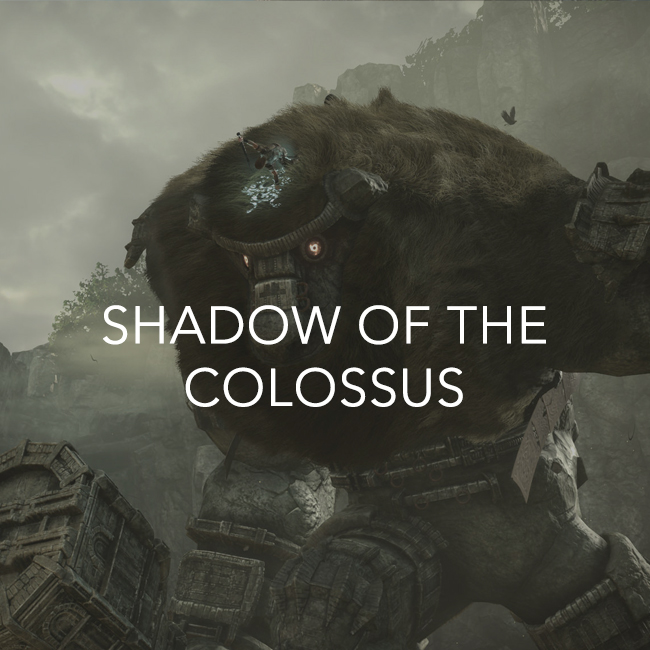
Chosen by: William Kirk
Developer: Bluepoint Games
Platforms: PS4
There have been countless great games released over the generations, but what truly defines a game as being “one of the greats”? As history has taught us (sometimes painfully), not every game we once perceived to be amazing ages well. In fact, it’s sometimes best to hold onto our memories rather than drag an old game through the mud for the sake of cashing in on nostalgia.
In my opinion, Shadow of the Colossus is one of the greatest games of all time. It was not only revolutionary when it released, it was a technical masterpiece for the PS2. Further to this, it provoked meaningful discussion about “games as art,” and it was critically acclaimed across the board and won countless awards. Its accolades are impressive, but what actually makes it one of the greats is how incredibly well it still holds up today.
The 2018 remake of Shadow of the Colossus is a breathtaking technical showcase and arguably the best remake ever made. However, what’s so amazing about it is that it’s simply icing on the cake. It’s the definitive way to experience the game, but I would no less recommend the original PS2 release or the PS3 remaster. The sense of loneliness felt in the world as Wander fights to save the one he loves, the complex emotions you’ll experience while engaging each of the colossi, and the bond you’ll form with your sole companion, Agro – it’s just as impactful no matter which version you play.
Shadow of the Colossus holds up on its own, and now a new audience has a way to experience the best looking version of one of the best games ever made. There have been a lot of heavy hitters in 2018, but if you’re looking for something truly special to play this holiday season, then look no further.
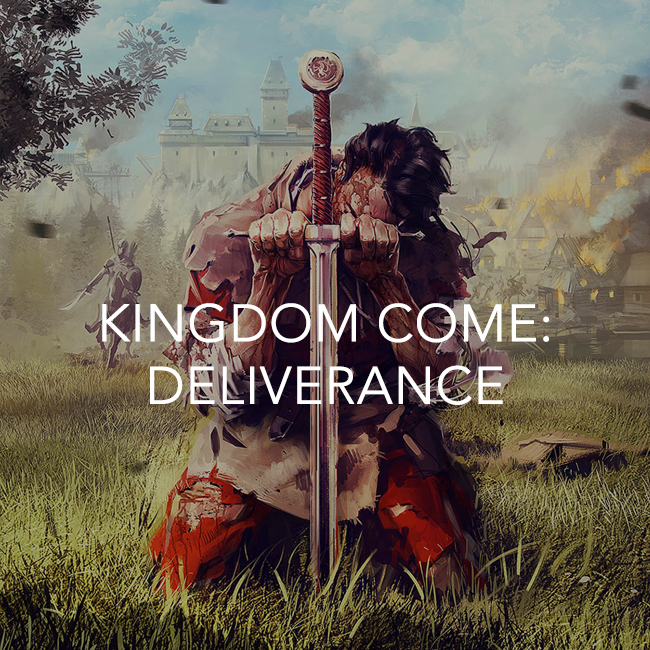
Chosen by: Daniel Kilzana
Developer: Warhorse Studios
Platforms: PS4, Xbox One, PC
Let’s get one thing out of the way; Kingdom Come: Deliverance (KC:D) shipped with such overwhelming and disruptive technical issues that it made heavily-modded Oblivion installations look stable by comparison. Even after 10 months of patching, there are still several quest-ruining, game-breaking bugs floating around Medieval Bohemia, along with a smattering of less consequential but equally immersion-shattering gameplay faults and graphical glitches. It’s a mess.
Underneath all of that, though, is a passionately crafted and engrossing RPG experience that demands careful consideration and an investment of effort from its players. The modern Action-RPG has conditioned us to expect powerful avatars and easily-gained progression, but this isn’t the case in KC:D. You’ll start the game incapable of swinging a sword properly, and you’ll stay that way unless you put at least a few hours into sparring with the local guard captain.
Gone too are the days of simply opening your recipe book and brewing a potion. First off, you can’t read, so learn to do that. Then gather the herbs, pestle them, boil the water, mix the right amounts and simmer for 30 seconds. Most of KC:D’s systems are this elaborate. Sometimes they border on tedium, but when the game draws to a close, you’ll look back on an experience defined by the choices you made, the systems you chose to master, and the way they shaped your journey.
We gave CD Projekt RED a chance, even though The Witcher 1 was a hot mess, and look where they are now. I think Warhorse Studios has earned the same opportunity. Just remember, in 2028, when Kingdom Come 3 is the most anticipated RPG of its generation, I called it way back in 2018.

Chosen by: Connor Weightman
Developer: Subset Games
Platforms: PC, Switch
Subset’s 2018 follow-up to FTL managed to not just be as good as their breakthrough title, it’s so different that such comparisons seem senseless. Into The Breach is a chesslike RPG where you always play defence, and you are pretty much always outnumbered, but you have one key advantage: you know exactly where the enemy is attacking, and you have a full turn to do something about it. This gimmick dictates an entirely different way of thinking about strategy, and around it, Subset has built an endlessly playable game.
Whether it’s the different mech squads and pilots you can unlock which open up new ways of playing, the seemingly endless generation of maps and objectives, the game’s generous approach to conveying information, the intuitive currency and upgrades systems, the ever tantalising prospect that maybe – just maybe – this will be the time you don’t screw it all up (though, probably, you will), or the sublime feeling of using a couple of well-placed shots to turn a threatening army on itself, Into The Breach is a remarkably fulfilling generator of strategy micro-puzzles. It is both the kind of game that feels very easy to dip in and out of at will, and one that can unexpectedly suck up whole hours.
It’s also an incredible expression of lo-fi restraint. The more I play it, the more I’m taken in by what it doesn’t do, the mess it doesn’t make, as much as I am impressed by what’s clearly there in front of me. It’s games like Into The Breach that get me excited about the possibilities of games that haven’t been made yet. Sometimes it’s more than enough to re-think what could technically have been done decades ago, had someone only thought of it.
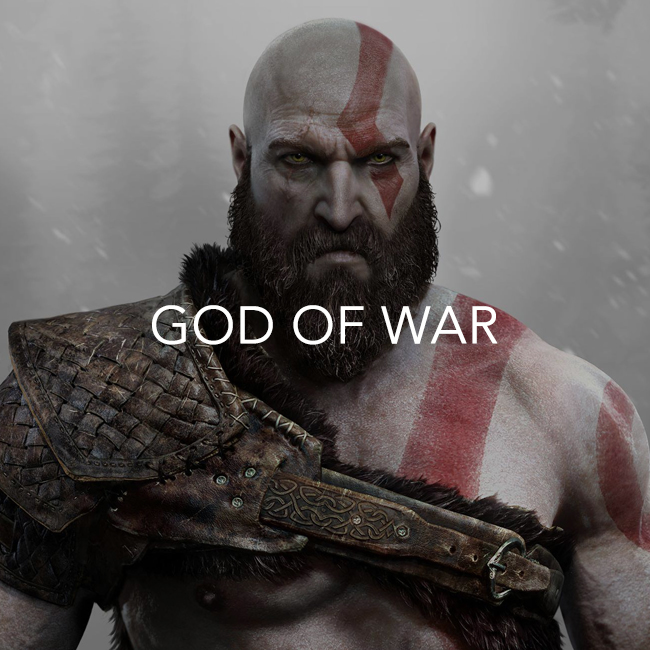
Chosen by: Blade Shaw
Developer: Santa Monica Studio
Platforms: PS4
In our Best of E3 2016 article, I specifically called out that I thought God of War was going to breathe new life into the beloved Sony franchise. Following that up, I locked in God of War as my most anticipated game in 2018. In short, I had put a lot of my opinionated eggs in the God of War basket – and I’m so glad my faith paid off. Not only do I get the immense pleasure of feeling like I was right, on top of that, but I also got to play what should be deemed as a generation-defining game for the PlayStation 4.
As we all know by now, God of War launched to critical and fan acclaim, which was topped off by a very heartfelt video that went viral of lead developer Cory Barlog checking the games Metacritic score for the first time before slowly breaking into tears. In a time where it’s easy to be sceptical about the games industry, there are also moments like this that remind us that there are people who genuinely love this industry and want to move it forward as an artistic medium, with the fruits of their labour (AKA financial success) being an added benefit.
I was utterly blown away by what we were served up this year, and I’m really looking forward to seeing where Kratos and Atreus’ adventures take them next. Wherever it may be, I’m going to be following that damn boy and his dad with the majestic beard.
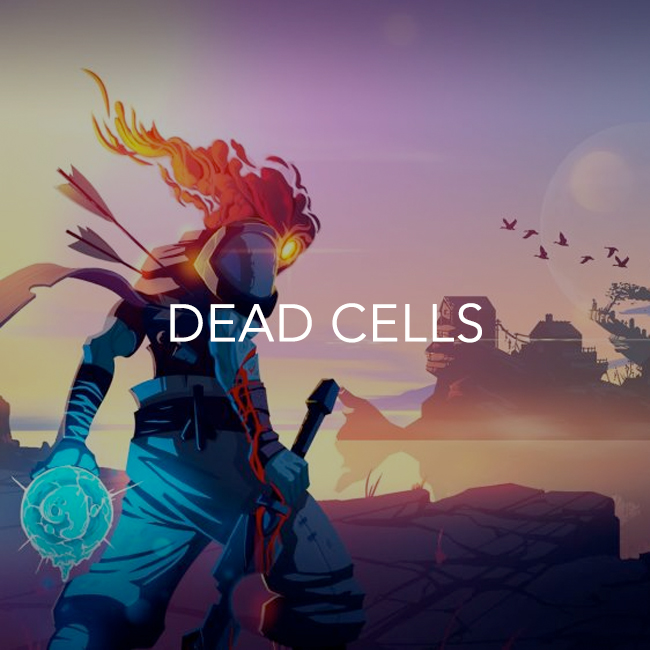
Chosen by: Nick Ballantyne
Developer: Motion Twin
Platforms: PS4, Xbox One, PC, Switch
At first glance, Dead Cells is a paradox of design. A procedurally generated Metroidvania roguelike sounds like a piece of medical equipment designed to induce testicle-shrivelling moreso than a genre. Looks can be deceiving, though, and Dead Cells offered up one of the most compelling and brilliant game experiences I’ve ever engaged with. You could play the game like a classic Metroidvania, sure, or you could speedrun your way through it like a roguelike, but neither felt half-assed.
From design to execution, the game is brilliantly thought out. If you play it like a Metroidvania, you’ll be focusing on getting more gold, more equipment and exploring every part of the level. If you play like a conventional roguelike, you’ll be sprinting through levels to get the bonus before the timer runs out. Both styles of play feel equally satisfying, thanks in no small part to the fast and synergy-driven combat.
Perhaps my favourite aspect of Dead Cells was the focus on meta-gaming. You’ll pick up items and abilities as you murder things in your path, but you’ll be trying out new builds on each run. Do you want to play a beefy greatsword wielding tank, or will you rely on dodging and turret placement? Distributing your stats to favour your build was as crucial as finding all the secrets of a level, and it gave the game unrivalled replayability as a result.
I don’t think it was a perfect game, but there’s no doubt that Dead Cells stands above any other game I’ve tried this year. Nothing else has quite taken me in with such riveting and unique gameplay, and it all felt so good! No other game this year made me want to run blindly into a dungeon and get myself killed, and for that, it gets my pick.
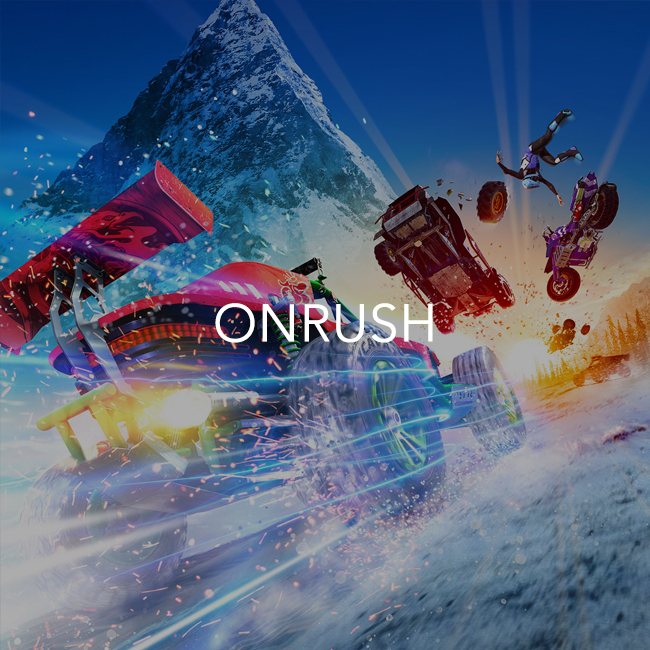
Chosen by: Alex Chalmers
Developer: Codemasters
Platforms: PS4, Xbox One, PC
Look, it’s been a pretty spectacular year in gaming, but cue my staggered surprise when my penniless hide indulged in a $1 Black Friday special for the Xbox Game Pass and dug into a little arcade racer recommended to me earlier this year by fellow staff writer, Kenneth Lee. I was not prepared. This is the crazy car-combat mutant mashup between Burnout, SSX and Overwatch that I never knew I wanted – and you owe it to yourself to try it.
Being a parent and less than a year away from being 30, things that make me feel like a kid again in terms of sheer irreverence tend to stick with me. The bombastic drum ‘n’ bass, dubstep and rowdy thrash pop that populates Onrush’s soundtrack do just that, and had me bobbing my head like a proper meathead. The tunes hook right into an old vein carved into my system by the likes of the Tony Hawk’s Pro Skater and Need for Speed soundtracks from the early 2000s.
The gameplay is also alarmingly engaging to boot, with design tropes ripped right out of MOBAs and hero shooters but framed around a teamplay racing combat dynamic, and it’s more addictive than it has any right to be. It also seems to be the most original racing game I’ve tried since Burnout asked me to blow up intersections over a decade ago. More pertinently, it’s the game of the month right now for PS Plus, so if you’ve got the chance to play it but haven’t yet, stop reading, you spooge. Get your rush on!

Chosen by: Harry Kalogirou
Developer: Insomniac Games
Platforms: PS4
Growing up with Spider-Man over the years has led me to play a majority of the wall-crawler’s video game escapades, and they’re quite a mixed bag. It was only a matter of time that Marvel would seek the success that DC found with the Arkham series, and the first real attempt of that comes in the form of Marvel’s Spider-Man, developed by Insomniac Games.
Insomniac have managed to craft an engaging narrative that spans across 10 or so hours, filled with fan-favourite villains and fresh takes on characters that leave this universe all its own. Peter Parker’s most appealing feature as a character, how relatable he can be, is expertly handled in a way that leaves this iteration of the man behind the mask one of the best.
The freedom and fluidity of being Spider-Man within an open-world New York is fully realised with a traversal system that evokes an intoxicating sense of liberation. Combat exhibits similar elements, with a wide array of gadgets and unlockable abilities that makes a seemingly shallow combat system more complex and accommodating for player expression.
Spider-Man’s visual fidelity is nothing short of fantastic, earning its spot with the likes of God of War and Red Dead Redemption II. It’s difficult not to gawk at gorgeous sunsets dropping over a never-ending skyline of buildings. It’s arguably the best recreation of New York City, and I’m still impressed by it after fifty-odd hours of playtime.
I hope Spider-Man marks the beginning of an age where licensed games, movie or otherwise, can rival the quality of games like Red Dead Redemption II and God of War when in capable hands. Much like Rocksteady did for Batman, Insomniac have effortlessly expressed how fantastic a Spider-Man game can be when given the proper care and attention to detail. It’s another outstanding achievement in Sony’s hallmark library of excellent exclusives, and I can’t wait to see where Insomniac take the webhead next.

Chosen by: Bernadette Russell
Developer: Playground Games
Platforms: Xbox One
It’s been a pretty good year for gamers, with very few disappointments in my opinion. Picking my favourite is always hard because more than one had a gripping narrative or adventure that made enough of an impression to stay with me. But this year one game stood out for me above even an epic Tomb Raider: Forza Horizon 4.
Don’t ask me about the story, because as far as I’m concerned there wasn’t one. Forza Horizon 4 is beautiful, stunning even, to the point where leaving the title screen on loop is just art in motion. The sounds feel like they’re ripped straight from real life, and the intricate details on the cars and amazing physics make it all so real that it keeps calling me back. I’m a secret revhead, and due to my inability to leave this game alone, just about everyone knows that now – and that’s a good thing, because I need to build my online crew. The online community can often be a reason for me to play most games offline, but in this case, I’d miss out on some of the most intricate car designs ever, and they add to the game experience.
There are plenty of achievements, extra things to do, like buying houses or a business, that there is enough content to keep me happy. Even if after the 100+ hours I’ve put into it, I wouldn’t care if all I had left to do was skid around in supremely beautiful and loud cars and enjoy the changing seasons and they morph the perfect landscapes. Forza Horizon 4, depending on how you play, is pure adrenalin or relaxation, but either way, it’s entertaining enough that I keep going back to it.

Chosen by: Lliam Ahearn
Developer: SIE Japan Studio
Platforms: PS4
Astro Bot Rescue Mission could pretty easily be dismissed as an uninspired 3D platformer. As a spin-off of PlayStation’s Playroom games, it doesn’t immediately come off as a brilliantly crafted, genre-defining VR title. That, however, is exactly what it is. Astro Bot is traditional through and through, seeing us run and jump through obstacle course-style levels and seek out collectibles on the way. It’s also revolutionary, utilising VR mechanics to involve players more actively, engagingly communicate scale and distance, and elevate the investigative elements of collectible hunting that can make it so much fun.
Astro Bot surprised and delighted me with its varied and exciting levels, taking awesomely unexpected turns several times throughout. Rescue Mission’s levels, as is true of the whole game, take paths well-tread and create involving, memorable experiences out of them. This is a game that plays so strongly to the fundamentals it was built upon, all while ushering the 3D platformer into a whole new dimension in wonderful ways. There’s no doubt in my mind that Astro Bot Rescue Mission will be looked back on as a landmark video game.

Chosen by: Kenneth Lee
Developer: Rockstar Games
Platforms: PS4, Xbox One
I’ve played many games in 2018, but no game succeeded more in transporting me to another world than Red Dead 2. Rockstar released its highly anticipated Western in October 2018 after an eight-year development cycle (and a large marketing budget to accompany it).
Most press outlets praised the game’s storytelling and bleeding edge technologies while commenting on its sometimes clunky gameplay mechanics. In my review, I echoed some of these thoughts and said that Red Dead 2 wasn’t always a particularly “fun” game to play.
Despite those observations, Red Dead 2 has still firmly cemented itself at the top of my list for 2018. Unlike most other games, you don’t just play Red Dead 2; you exist in its world. The immersion and sense of place are simply unrivalled. I wanted to follow regular routines – for example, waking up with a fresh cup of coffee as I make my way around camp saying “good morning”. A big part of this immersion is the fantastic physics system that makes you feel grounded in the world as opposed to just floating around in it. It also helps that every choice (from your selection of clothes to your choice of who to kill) has cause and effect. The game constantly reminds you of those consequences.
During the recent Black Friday sales, I got an Xbox One X. I liked Red Dead 2 so much that I’m going to fire up Red Dead 2 again and no doubt sink another 70 hours of my life into it. As far as praise from me goes, that’s pretty much as good as it gets.

Chosen by: Ellis Longhurst
Developer: Game Freak
Platforms: Switch
Prior to the release of Pokémon: Let’s Go, the game was not even on my radar. It’s essentially a HD, Nintendo Switch remake of the original Pokémon video games (which had already been remade back in 2004 as Fire Red and Leaf Green). Did we need to have the same story retold? I thought not.
But Game Freak decided it was necessary and that they were going to deliver it in an innovative way – by changing features of the core gameplay and incorporating Pokémon GO elements. It was a risk. People are resistant to change. Pokémon: Let’s Go had to be faultless…
And it is. I cannot fault Pokémon Let’s Go – the graphics, the design, the gameplay, the implementation of the optional peripheral accessory are all excellent. This is also one of few Nintendo Switch games that I have enjoyed equally on the handheld and console modes.
The clever integration of the Pokémon GO features (like the catch mechanic, Pokémon transfer and non-random encounters), means that Pokémon: Let’s Go has brought (and continues to bring) new Pokémon players, Pokémon GO fans, and experienced Pokémon players to the Nintendo Switch. I guess the Pokémon Company and Nintendo have their own understanding of “Gotta Catch ‘Em All”.
But it was not just the game that brought players in, the social climate that the game has created (a la Pokémon GO, but to a lesser extent) means that the experience does not end when you turn off the Nintendo Switch. For example, comparisons of how long it took to get shiny Vulpix or how cool it is to ride an Arcanine have become routine conversation at my previously non-gaming related workplace. In the last few weeks, I think I’ve greeted a handful of friends with “have you bought Pokémon: Let’s Go yet?” It’s fun. It’s polished. And you can dress up your Eevee. What more could you want?










